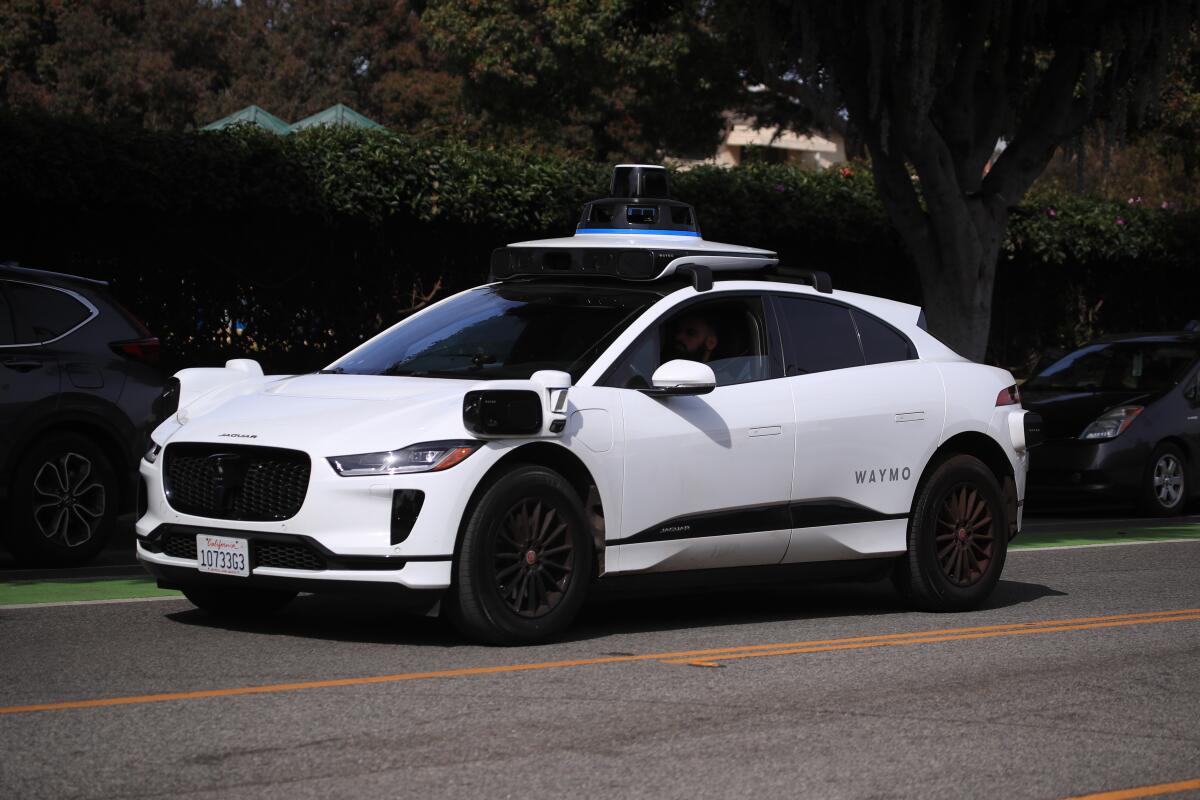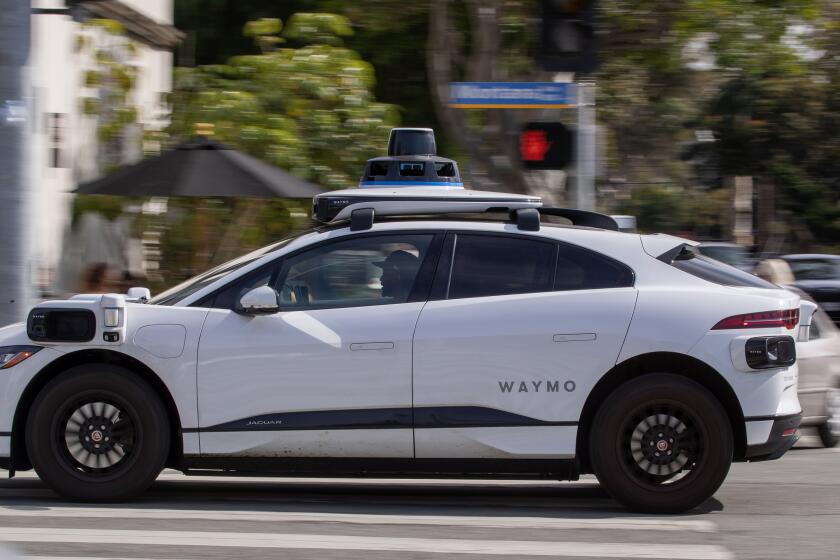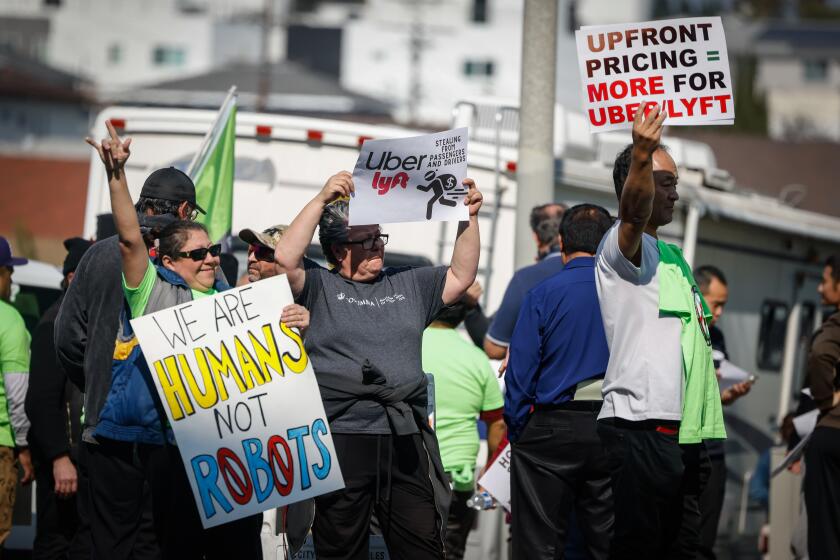San Mateo County is the latest community expressing concern against Waymo, driverless cars

- Share via
Another California community is raising concerns about plans to unleash the Waymo self-driving vehicle in its jurisdiction, following several incidents involving autonomous ride-hailing cars that resulted in injuries.
On Wednesday, state regulators delayed any decision on Waymo’s request to expand its service area from the City of San Francisco to portions of the San Francisco Peninsula and to begin service in Los Angeles. Waymo is owned by Google’s parent company, Alphabet.
Last week, San Mateo County requested more information from state regulators before allowing Waymo to operate its driverless vehicles there. The county’s request came after Waymo asked the California Public Utilities commission to approve the proposed expansion of its Automated Vehicle Passenger Services into the county and the southwestern part of Los Angeles County.
San Mateo County Board of Supervisors Vice President David J. Canepa said the commission’s decision to pause Waymo’s request “will provide the opportunity to fully engage the autonomous vehicle maker on our very real public safety concerns that have caused all kinds of dangerous situations for firefighters and police in neighboring San Francisco.”
The company has already been serving a portion of San Francisco, from Lands End to Bernal Heights. The autonomous car company began offering rides for a limited time in November in Santa Monica, Century City, West Hollywood, Mid-City Koreatwon and downtown L.A., giving residents a chance at testing the driverless ride.
Waymo’s driverless taxi launch in Santa Monica attracted both excited enthusiasts and concerned critics.
Waymo received approval on its plans to expand where it can provide its passenger carrier service from the California Department of Motor Vehicles just days before.
The commission’s pause on deciding Waymo’s request to expand does not effect it’s current service areas.
San Mateo County’s attorney John D. Nibbelin said the county protested the commission’s pending approval, saying the county didn’t have enough information on the expansion plans or enough engagement with Waymo.
“The ‘quick and simplified’ advice letter review process, which is intended for ‘requests that are expected neither to be controversial nor to raise important policy questions,’ is insufficient to develop the evidence necessary to fully understand the potential impacts and issues Waymo’s expansion into San Mateo County will create, including accounting for the differing needs and hurdles Waymo will face operating in San Mateo County, as compared to City and County of San Francisco,” Nibbelin’s letter to the commission stated.
San Mateo County Officials and other communities say they want a say in the regulation of driverless car company operations.
In a Feb. 13 county board of supervisor meeting, the board approved a resolution in support of Senate Bill 915, which would grant local governments the authority to permit or prohibit the use of driverless cars within their jurisdiction.
Waymo representatives met with some members of the San Mateo County Board of supervisors and county executive officer Mike Callagy, said Michelle Durand, the county’s chief communications officer.
Drivers for Uber, Lyft and DoorDash staged a one-day work stoppage to protest poor wages.
“The conversations were fairly general, but Waymo didn’t provide any specifics of their operation plans in San Mateo County, saying that those are still in development,” Durand said.
For the record:
1:33 p.m. Feb. 21, 2024An earlier version of this story misspelled a Waymo spokesperson’s last name. It’s Julia Ilina.
Waymo spokesperson Julia Ilina said that ahead of the company’s application to expand its service area, it reached out to stakeholders including county officials, local first responders, cities, bike coalitions and others.
“Our briefings included information on Waymo’s mission, experience and how our technology works,” Ilina said.
“Additionally we were transparent with stakeholders about our interest in expanding Waymo’s commercial ride-hailing service for members of the public to include Peninsula cities.”
Currently, local jurisdictions have no say in the commercial deployment of autonomous vehicles.
In Los Angeles, Mayor Karen Bass said her city should have a say in how such vehicles are regulated and asked state regulators in November to increase their scrutiny of companies that operate autonomous vehicles. In August, a Waymo car failed to initially stop for a traffic officer who had been signaling east- and westbound traffic to come to a stop at Beaudry Avenue and Wilshire Boulevard. No injuries were reported in that incident.
Waymo’s driverless taxi launch in Santa Monica attracted both excited enthusiasts and concerned critics.
On Feb. 7, a cyclist was injured in San Francisco by a Waymo vehicle. SFGate reported that the vehicle stopped at a four-way intersection before proceeding; a large truck was driving through in the opposite direction. A cyclist was near the truck and crossing into the Waymo vehicle’s path. When the cyclist became visible, the Waymo vehicle applied its brakes but was not able to avoid the collision. The cyclist had non-life-threatening injuries.
More to Read
Sign up for Essential California
The most important California stories and recommendations in your inbox every morning.
You may occasionally receive promotional content from the Los Angeles Times.













